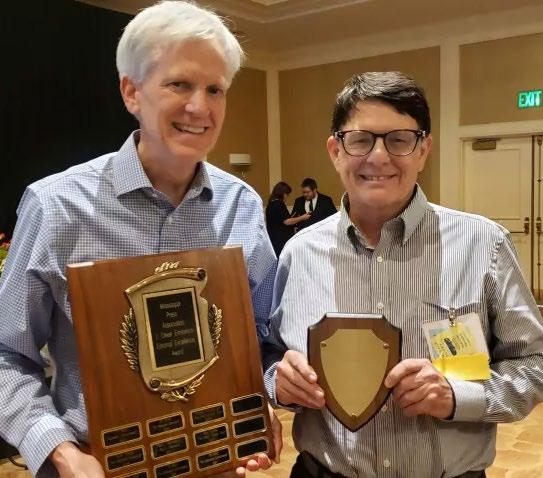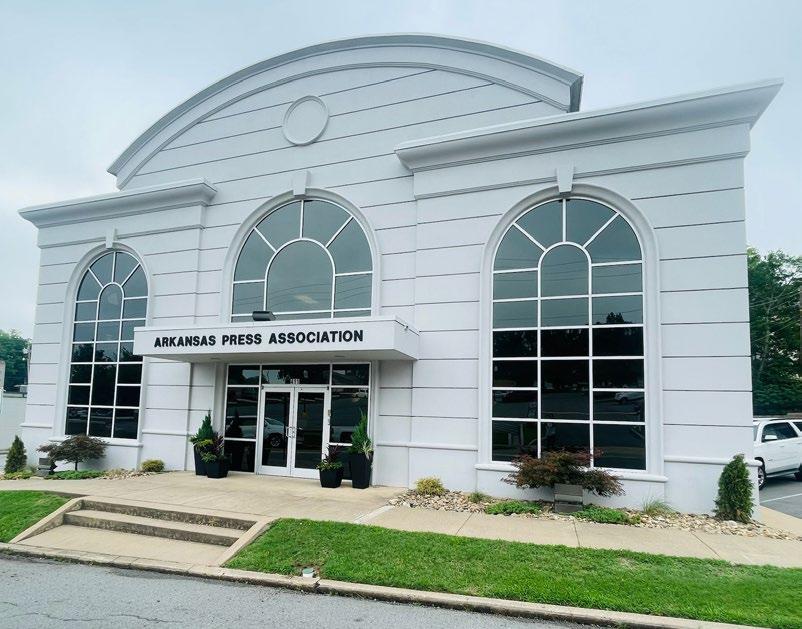Guest Column:
By Adam Skrunk Community journalism starts with community


By Adam Skrunk Community journalism starts with community

Vol.19 | No. 38 | Thursday, September 26, 2024 | Serving Press and State Since 1873
Wyatt Emmerich, a third generation newspaper publisher, is leading the legislative and judicial charge to combat the dominance (and many believe unfair advantage) of Google and Facebook in the online advertising world.
Emmerich and allies have filed lawsuits and promoted legislation in Congress to deal with what they consider predatory actions by the two online behemoths. He invites all Arkansas newspapers and others across the country to join the effort. “It costs nothing, and you can withdraw at any time,” Emmerich said.
Emmerich serves as president of Emmerich Newspapers, a company which consists of 22 publications in Mississippi, two in Louisiana and one in Arkansas. The Arkansas property is the Dumas Clarion, which the company acquired in 1998 from Melvin and Charlotte Schexnayder Linna Jones currently serves as editor and publisher.
Concerning the negative effect that Google and Facebook have had on newspapers across the country, Emmerich said, “I think we all saw the internet coming and online news coming. What we didn’t see is how a couple of companies would come to monopolize this entire space.
pointed out that the United States has lost a third of its newspapers and local websites over the past 10 years, with an equal number projected to disappear over the next three years.
“This summer, a federal judge declared Google to be an illegal monopoly,” Emmerich wrote. “Ninetyeight percent of searches occur on Google. There is no escape.”

Wyatt Emmerich
“One way that they were able to do that is to create vast spy networks where they track your every keystroke and where you go, and everything you search and click on and then use that to create an intensive profile of you which they then sell to advertisers. It’s very hard for smaller companies to compete against that because only the biggest of the information monopolies can create a vast spy network broad enough to know everything about everybody.”
Emmerich recently returned from Washington, D.C., on a mission where he “was trying to save journalism.”
In a column published in numerous Emmerich newspapers, he
Emmerich notes that huge monopolies of the past, such as John Rockefeller with oil and J.P. Morgan with railroads, led to antitrust laws. Those laws were enforced by the courts, breaking up the monopolies and restoring the competitive free market.
“Oil, steel, railroads, phone calls and operating systems are all important,” he wrote. “But nothing is as important as information itself. That’s why Google’s monopoly on information is so dangerous.”
Emmerich said the problem began when Congress passed the Communications Act of 1996. Section 230 of the law gave internet platforms legal immunity. Newspapers must produce information that is true and not libelous, but internet companies are free to publish without fear of legal action.
“Google and Facebook don’t have to hire reporters, editors or defend themselves in court, thanks to Section 230,” Emmerich wrote. “Instead, these platforms just scrape content from legitimate news sources and republish the content as their own. Or they just publish non-professional posts from anybody who has an opinion, much of which is false.”
Emmerich Newspapers is a member in a class action lawsuit filed in December 2023 by Helena World Chronicle, LLC against Google for its monopoly. Other newspapers are encouraged to join in the action. Attorneys experienced in antitrust work have been
Continued from page 1
employed in the effort.
Additionally, an effort is being made in Congress in the form of the Journalism Competition and Preservation Act, which would force Google and Facebook to pay royalties to the news providers for the content they now steal. The measure has passed the Senate, but Rep. Jim Jordan, chairman of the House Judiciary Committee, currently is blocking it in the House.
“So now we have two fronts in the war – one legislative and one judicial,” Emmerich wrote. “You should pray for our success. Our Democracy is at stake. Our freedom and our culture are at stake. We must all open our eyes and see.”
Emmerich lives in Jackson, Mississippi, and is publisher of the Northside Sun in that city. The publication is one of the largest weeklies in Mississippi and regularly prints up to 48 pages.
“It is a suburban weekly, as opposed to a county seat newspaper,” Emmerich said. “Suburban areas are doing better than small, rural towns, but some of the business challenges are the same.
“Overall, the status is dire for newspapers. In many ways, we are on life support.”
Emmerich’s company publishes some of the most historic newspapers in Mississippi, such as the Delta Democrat Times in Greenville, known nationwide in the past due to its Pulitzer Prizewinning publisher and editorialist Hodding Carter.
Emmerich paints a sad picture of the current state of newspapering in Greenville, and similar rural communities – “it’s a declining industry in a declining market. But we are still there.”
Other historic newspapers owned by the company are the McComb Enterprise-Journal and the Greenwood Commonwealth, published in the past by his late grandfather, Oliver Emmerich, and his late father, John Emmerich, respectively.
Looking at the current situation and future of community
newspapers, Emmerich would start by changing that term.
“I would refer to them as local news providers,” he said. “Because all newspapers have websites associated with them. The huge amount of news and information now available online makes it harder to attract people with local news content. There’s just so much else out there to read about. Social media has created a huge distraction, and good local news is lost in the crowd.”
Emmerich was born in McComb and later lived across the nation, in places such as Baltimore and Houston, as his father worked for big-city newspapers. His father then acquired the Greenwood paper when Emmerich was 15 and he graduated from high school there.
It was later on to Harvard, where he earned a bachelor’s degree and served as editor of the famed Harvard Crimson. He then earned a master’s degree in business from UCLA. Emmerich was a reporter for Cocoa Today in Florida, the Dallas Times Herald and the Philadelphia Inquirer. He worked on Wall Street with Merrill Lynch as an investment banker to the newspaper industry. Prior to that, he was a senior analyst for strategic planning for the New York Times Company.
Emmerich has been very involved in various civic endeavors in Jackson, including the Salvation Army and the Metro Crime Commission. He also served as president of the Jackson-based Clean Water for Malawi, which has drilled or repaired over 400 water wells in Africa, bringing fresh water to over 250,000 villagers. He was voted one of the Top 50 Most Influential Mississippians in 2019.
Emmerich writes a weekly column published in various newspapers across Mississippi. He has won 27 first place writing awards in the annual Mississippi Press Association contest. In 2014 and 2017, he won the National Newspaper Association’s first place award See EMMERICH Page 3

Continued from page 2
for column writing. In 1994, 2016 and 2017, he won awards for investigative reporting from the National Newspaper Association. In 1981, he won the National Investigative Reporters and Editors first place national award for investigative reporting.
Emmerich is married to the former Ginny Knight of Taylorsville, Mississippi. They have three children, John, 26, Lawrence, 24, and Ruth, 20. They are members of the Covenant Presbyterian Church, where he has served as a deacon. He is an instrument-rated pilot and flies a Cessna P210. His hobbies are diverse and include golf, tennis, sailing, flying, guitar, lawn maintenance and French.
He is unsure whether the fourth generation of Emmerichs will continue in the newspaper business. “It kind of depends on whether there is a clear path forward,” he said. “There is just so much uncertainty right now.”
Obviously, one key will be whether his efforts relating to Google and Facebook ultimately are successful. If so, that could provide a “big capital infusion” into newspapers.

Emmerich believes local journalism remains important for communities in Mississippi and across the nation.
“We have hundreds of journalism schools in this country that train people on how to write stories, how to be objective and how to check facts,” he said. “Solid professional and local news is critical to the smooth functioning of a democracy. When you substitute professional journalism for amateurish, superficial social media posts you create disinformation and fake news that leads to social chaos. That’s exactly what we’re seeing.”
Through it all, Emmerich has gained satisfaction from his role in the history of journalism in his state and maintains hope for the future.
“People desperately need and want to know what’s going on around them. Being able to supply this in a proper manner is immensely satisfying.”




Destin Davis has been named the managing editor of The Saline Courier in Benton, the newspaper announced.
A native of Bryant, Davis holds a degree in Political Science and History from the University of Arkansas. He joined the newspaper as a reporter in August 2021, covering politics, local government and local news. He succeeds Randal Seyler in the managing editor role.
“I’m excited that Destin is taking on this important news leadership position at The Saline Courier,” said Regional Publisher and Advertising Director Rhonda Overbey in the announcement of the promotion.
“As a Saline County native, he is wellsuited to the role, and understands what is important to our readers and the community. I know readers will join me in congratulating Destin on his new position.”
“I care deeply that the people of Saline County are aware of what is happening in their community, both the good and the bad,” said Davis in the announcement. “We live in a time when people trust the news media less than ever before. I believe that at The Saline Courier, that trust has been maintained before I was here, and I look forward to continuing to honor the trust our readers have in our paper.”
The Arkansas Newspaper Connection is a weekly newsletter published by APA connecting freelance and independent writers, editors, photographers and designers with Arkansas newspapers in need. Lists available job openings and other opportunities at Arkansas newspapers and associate member organizations. Send your listings to info@arkansaspress.org.

The final issue of The Spectator, Ozark’s 113-year-old community newspaper, was published this week. Competition from social media, unpaid advertising bills and lack of community support were cited as the main reasons for the closure.
“Throughout its life, The Spectator strove to inform and entertain Ozark and the surrounding communities,” the newspaper wrote in the announcement of its closure. “In many ways it was a glue that united the diverse people of the areas it served. Even though social media is widely spread and used, it will never be able to inform as The Spectator did. Unless you are friends with specific people you will never know the marriages, births and deaths of the community at large. Instead of one paper holding everyday information, many websites will have to be used.”
The Spectator was founded in 1911 by Reuben H. Burrow. His sister, Elizabeth A. Burrow, who in 1957 won a National Editorial Association award for her editorial defending the admission of African Americans to the Ozark high school, served as editor for 30 years. Following her death
her nephew, Isham Lafayette Burrow, continued to publish the newspaper until 1967, when it was sold to Orval E. Faubus and Francis J. Murray of the Madison County Record in Huntsville.
Faubus sold his half-interest to Murray in 1969, who in 1970 formed Ozark Spectator, Inc., with Bob J. Bevil, who had been working at the newspaper since 1967. Bevil served as publisher of The Spectator until his death in 2021. The newspaper has been published since by his widow, Pat Bevil. Their daughter, Tracey Bevil Kendrick, is the long-time manager.
In addition to Bevil and Kendrick, on staff at the newspaper are Jo Eveld, Vernon McDaniel, Robbi Roberts, Paula Dominique and Bronson Ruston.
The Spectator is one of two newspapers based in Franklin County, the other being the Charleston Express. The Graphic in Clarksville also has coverage in Franklin County, and plans to start covering Ozark school news and city government.
The United States International Trade Commission held a hearing on September 17 to consider proposed tariffs on Aluminum Lithographic Printing Plates from China and Japan.
A range of impacted businesses, including newspapers, testified against the tariffs, but no party testified in favor of new tariffs on printing plates.
Adam Meyer, publisher of The Jackson Hole News & Guide and COO of Teton Media Works in Jackson, Wyoming, testified that the trade case and resulting duties will cause serious harm to the news media industry.
“It’s clear that the increased cost from these additional duties may well be the difference between keeping a small profit to preserve jobs for professional journalists, or potentially suffering a loss that eliminates news reporting resources,” said Meyer in his testimony. “This plate duty may likely cause more community newspapers, many of which were already on the brink of sustainability, to stop publishing a print edition.”
Newspapers across the country have editorialized against the tariffs. The ITC will vote and make a final determination on October 22. On November 4, the ITC will issue a written rationale for the decision.
The United States Postal Service announced last week that it will not raise prices for Market Dominant mail products in January, according to the National Newspaper Association.
NNA confirmed that while a news release from USPS specifically referred to no price increases for stamps, newspaper rates will also remain at current levels until at least July of 2025. This will be the first time since the beginning of 2023 that the USPS has refrained from raising prices two times a year.
NNA has been vocal with decision makers in Congress, at the Postal Regulatory Commission and within the USPS about the negative impact excessive twice-a-year increases are having on publishers.
“It remains to be seen whether this is the beginning of a new approach to limit volume-killing rate hikes or a one-time respite,” said NNA Executive Director Lynne Lance. “NNA will continue to be vigilant as the USPS considers the scope of a likely increase due next summer and urge continued moderation.”



Running a local newspaper can be one of the most frustrating, worthwhile, mundane, exciting, demanding, rewarding endeavors you can take on. Sounds great, kids, doesn’t it?
This year, we received the honor of a request to tell our story as part of National Newspaper Week. The week serves to highlight the important work local newspapers do in their communities and remind people nationwide of the value local news provides.
What’s our story? Many of you know it already. We were dumb kids who started a business in Newton, Kansas, with the idea that a community would pay for and support a locally owned newspaper filled with local news.
Start-ups are increasingly common today. In 2015, our idea was regularly greeted with the question, “You’re doing what?”
Naivete rarely gets rewarded in the business world. But for us, it was what allowed us to move forward.
There’s a statistic that is bandied around. Roughly two out of 10 Americans have met or spoken to a journalist.
It usually gets cited in various think pieces about the decreasing trust of the public in the media.
People who’ve met a journalist are much more likely to trust what’s reported in the news than people who have not.
We don’t doubt that statistic. But we don’t think it holds quite true in Harvey County. We don’t think we’d be in business if that statistic was true.
When we opened, we hired Wendy Nugent, a long-time area journalist who’d met and interviewed residents of the county. Since working for us, she’s written roughly 2,800 feature stories over her nine years. She’s met a lot of people.
Bruce Behymer, the marketing dude, was a
By Adam Strunk
lifelong Sedgwick native. And he knew just about everybody. It’s still difficult to have a conversation with him in a public setting without at least three people interrupting to say hi.
Three of us moved here for the first time, though Lindsey Young did a stint at Bethel College many years ago.
As we opened, we endeavored to be everywhere, speaking at local clubs and senior centers, even selling subscriptions from a truck tailgate at the farmers market.
We did this because we knew that if we could just communicate with many people what we were doing, people would believe in it and support us.
Over the years, all of us got to know the community and the readers.
We’d think that a good many of you who take this paper have spoken with us on the phone when buying a subscription, stopping in the office to chat, or doing an interview with one of our reporters. You might have had us take your ticket or pour you a beer at our annual Blues, Brews and Barbecue concert. You might have attended one of our monthly Press Club mingles. We invite subscribers to come by the office and come to a mingle, in part so they can get to know us better.
We’d hazard to say, at this point, the majority of our readers know at least someone at the paper.
That’s by design. And that’s been important to us.
To us, local journalism isn’t about watching a community succeed and struggle from afar. To us, local journalism is a way to participate in a community we care about by providing useful information, as well as a little bit of accountability, entertainment, and joy along the way.
We want what’s best for the community, because it’s our community, filled with our readers, our friends, and our neighbors.
There’s a joke that everyone hates Congress but loves their congressperson. To us, we’ve seen that with the paper. Many of our readers are skeptical of national media, but they support the paper. “You’re one of the good ones,” is a compliment that we’re perhaps happy to get but makes us cringe just a tad, as well.
We’re not doing things too much differently than some bigger publications. But we are visible, accessible and around.
And in doing so and in covering issues the way we’ve done over the years, we have the trust of many of you. A lot of trust. That’s not something we take lightly.
So if we’ve earned anything over our time and have to leave with one thought, it would be that we believe newspapers have a key impact on our communities. They keep the government honest. They keep people informed and connected. They provide a snapshot of life, far outside social media bubbles.
They advocate, desire to right wrongs, and seek to make where they operate a better place.
We thank you all for giving us that opportunity, we thank you for your support, and we look forward to filling this role for many years in the future.
We hope you view our publication not only as a window to the community but an important part of its structure.
And if you have thoughts, as always, you know where to find us.
Adam Strunk has served as the managing editor of Harvey County Now since its founding in 2015. He is also a partner and director of editorial content with Kansas Publishing Ventures and serves on the board as legislative director for the Kansas Press Association. This column, plus more no-cost National Newspaper Week content, can be downloaded from www.nationalnewspaperweek.com.